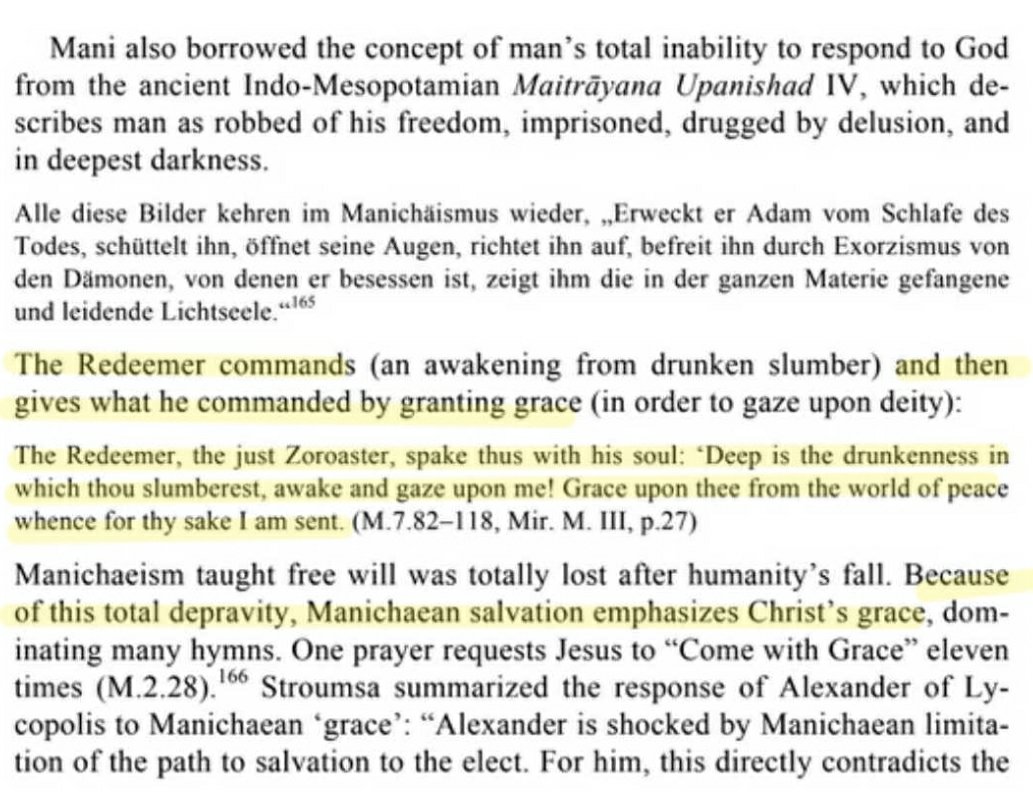
An Example of Inconsistency
On pages 34-36, Dr. Wilson begins the discussion of the influence of Manichaeism on the discussion of free will and Augustine. Here is a section from page 35:

Using Different Scales
Originally I intended to make some remarks on Augustine’s Manichaeism. However, I have put that off until the next post. In this post, I want to discuss something that I noticed in Dr. Wilson’s comments above. He stated “The Redeemer commands (an awakening from drunken slumber) and then gives what he commanded by granting grace (in order to gaze upon deity)” (I will note that it appears Wilson is further poisoning the well by using this same phraseology from one of the most famous lines in Augustine’s Confessions where he stated “O Lord, command what you will and give what you command.” This is done in order to associate what Augustine said with what is retroactively attributed to come from Mani’s thought in Wilson’s work.) This statement by Wilson is followed by a quote from Mani in which it was stated that The Redeemer said “awake and gaze upon me!”
If you will refer back to my first post, you will see how Wilson thought that he was able to see and prove “traditional free choice” from the Letter of Clement to the Corinthians. Dr. Wilson stated such things as “Humanity’s creation in God’s image provided current opportunity for moral behavior” and when Clement used scripture’s calls for repentance from iniquity, Wilson stated that such things were only a “rhetorical strategy” which “could only be effective if the author and readers shared [part of God’s Image] retained within humans as free choice.” This meant that when Clement (and by extension God through His Word) exhorted sinners to repent (i.e. awaken) that he was appealing to their free choice to overcome their sin.
Another example from Dr. Wilson’s dissertation can be seen on page 42:
“[Hermas] sternly warns Christians of the dangers of the evil desire leading to death (Herm. Mand. 12.1 [44.1-2]). This and similar admonitions may presuppose some residual ability to respond to God.” (Page 42)
As he stated with Clement and here from the Shepherd of Hermas, “admonitions” by God only prove that mankind has “some residual ability to respond to God.”
However, on page 35 above we come across the same sort of thing here in these statements of Mani. We read there that this “Redeemer” told a person to “awake and gaze upon me”. Rather than being seen as proof of “total inability”, why would Wilson not see that as mankind being “provided current opportunity for moral behavior” or Mani using some “rhetorical strategy” in order to urge on man’s free choice to wake up and come to this redeemer? The answer is rather obvious. Manichaeism, and Augustine afterwards, was deterministic and therefore anything that the Manichaean god was telling man to do meant that there was not anything that man could do to thwart the will of god. That man must wake up because the Manichaean god commanded it.
Jesus The Redeemer?
Also, and I will not pull much on this thread, who was it above that Mani stated was “The Redeemer” who called for people to awaken? It was Jesus who Mani spoke of as the Redeemer, right? Wilson stated right after the quote from Mani about “The Redeemer” that “Manichaean salvation emphasized Christ’s grace”.
But please do not let this slip by you! Mani said that the “Redeemer” was “that just Zoroaster“. Mani was not saying that the Trinitarian God who we follow was the “Redeemer” but rather it was Zoroaster about whom he spoke! Yet we are supposed to believe that Augustine assimilated the beliefs about this false god of Manichaeism into Christianity because, obviously, Augustine’s God was not the God of Scripture. This is what it boils down to – it’s the logical conclusion that Wilson is making.
Conclusion
I hope that you can also see the inconsistency in how Wilson would attribute to Augustine some latent Manichaeism being inserted into Christianity. According to Wilson, when we read about these calls to awaken or repent in Manichaean writings, that “emphasizes Christ’s grace” (even though he was talking about Zoroaster and not Christ!). The theory is that Augustine was promoting the doctrines which he knew as a former Manichaean – ideas regarding God’s determinism in salvation and the loss of man’s will.
However, someone like Wilson has also asserted that Biblical calls to repent or wake up must mean that man has that capability within himself to fulfill that call. Here we have just seen a similar statement by Mani where one is told to awaken. The “traditionalist” would read these statements in Scripture as meaning that man has moral ability to heed the call himself and wake up, but the same person will read some type of determinism into a statement by Mani. I would urge that we try to be consistent with regards to how we interpret passages based off of our presuppositions. I am in no way trying to defend the statement by Mani – he was, as we have seen, not even talking about the Christ of the Bible as the Redeemer but rather was talking about Zoroaster! What I am trying to do is to urge you to consider whether you are using the same criteria when you read traditional libertarian free will into early church fathers but not into what Mani was saying. Either admonishments to wake up “emphasize Christ’s grace” over man’s will or they don’t!
Regarding the statement from Wilson on this same page (that “free will was totally lost after humanity’s fall”), I see that Dr. White has written a post on the inconsistencies in that particular sentence. After reading his post along with what I have demonstrated above, the reader can understand how Dr. Wilson is not using equal scales in his approach to Augustine.
Tags: chrisw-kenwilson

